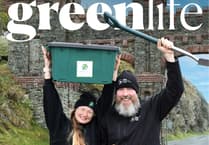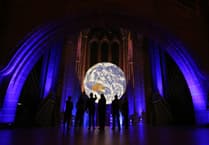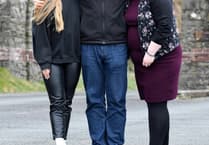The Isle of Man might not have a Wagamama, but British TV presenter Monty Halls thinks the the island has the potential to be a world leader. Other countries would be green with envy, but not as green as us because Monty thinks we’re paving the way in our environmental achievements. Mont - as his close friends call him, which is what we are now - came to the island last year to compere Media Isle of Man's Awards for Excellence and has been kindly singing our Biosphere-boasting praises ever since. We had a catch up with Mo to find out more about the genius work he’s been doing to help make eco-friendly work more accessible for everyone. And get more compliments on things M thinks we’re doing well.
You’ve led a fascinating career across broadcasting, the Royal Marines, marine conservation, and are now a firm figure across environmental initiatives around the world. Tell us about this transition into the conservation space; what was your main inspiration for a career in the environment and conservation?
Pretty simple really (and one of the reasons for setting up the Leaderbox Blue initiative) – I was always an outdoorsy kid. I grew up on the coast of the South West, all my heroes were explorers, divers, and conservationists, so I was always going to end up in some facet of sustainability and ocean advocacy. The rationale for the Leaderbox Blue system is to try to get as many people “hands on” with that world, so they too can fulfil their ambitions to contribute positively to the marine environment.
Last year, you were Media Isle of Man’s special guest at the Awards for Excellence as it celebrated the RNLI’s 200th anniversary and the island’s rich affiliation with the seas. What were your first impressions on visiting and hosting the event?
It was great! A really warm welcome, some incredible award winners, and a great evening all round. I even managed to fit in a dive with Leigh from the Wildlife Trust, so all in all a great introduction to a special place (I’d never been before, which for a marine biologist is positively criminal).
You’re now working with Visit Isle of Man to encourage engagement with environmental and conservation initiatives. Tell us more about the Leaderbox Blue Scheme; what is it and what does it aim to achieve?
In the simplest terms it’s a marine conservation project in a box. It can be run by anyone, or any group (a business, a club, a school, and even an individual) and offers five different marine conservation projects that can be conducted entirely by volunteers with no scientific training. I’ve always felt that global problems are best tackled by local solutions, and no-one knows their own coast like the people who live there. The system gives everyone a chance to get hands-on in addressing these issues by running their own projects.
The Isle of Man is the world’s only entire nation to have been granted UNESCO Biosphere status – what opportunities does this present the Isle of Man?
Just massive. What a badge of honour that is, on a global scale. I think the first thing I thought is “Why?”. I don’t mean that in a bad way, I mean that it made me want to explore the environment here, to meet the people involved, to discover the proactive nature of that relationship. It makes you want to visit, to dive deeper, and be part of the story. It’s very special.
You’re now familiar with the island – what would you recommend to enterprises or organisations on the Isle of Man with a view to building a prosperous, sustainable future?
Islands by their very nature offer a rare opportunity for their inhabitants to co-operate, to create new initiatives, to lead. You are a self-contained ecosystem, and a self-contained society that can make decisions quickly, something not available to larger nations simply due to scale. I believe that the Isle of Man has the opportunity to be a world leader, to set standards, and what’s more has the means to do so quickly. Change is already afoot on the island, with some great initiatives, but momentum is really important I feel. It’s a genuine chance for the Isle of Man to set the standards other nations will follow.
Your home country of Devon is known for its exciting approach to sustainable living and tourism. What would you say to local businesses and organisations keen to make positive impact in these fields?
I’d just note that these are no longer simply feel-good tweaks to standard practice, they are now important to consumers and visitors (and soon will be essential for them, one of the first things they seek). Legislation around ESG is also becoming a lot more precise and exacting, so it’s good to get ahead of the game and explore those sustainability measures sooner rather than later.
What’s the most impressive or exciting sustainability initiative you’ve ever seen at a local or community level?
Definitely Leaderbox Blue! Actually, it’s another project we came across when we were researching and developing the system, when we met other people setting up sustainability projects. It’s a guy in Bude in North Cornwall, a surfer, who has created a filter you can attach to your washing machine that stops all the microfibres from your clothes getting into the sewage system and subsequently the sea (it’s the equivalent of shredding a plastic bag once a fortnight and putting it straight into the ocean). It was such an elegant, simple, brilliant device, and illustrated that we can engineer genuine change simply and effectively. Inspiring stuff!




